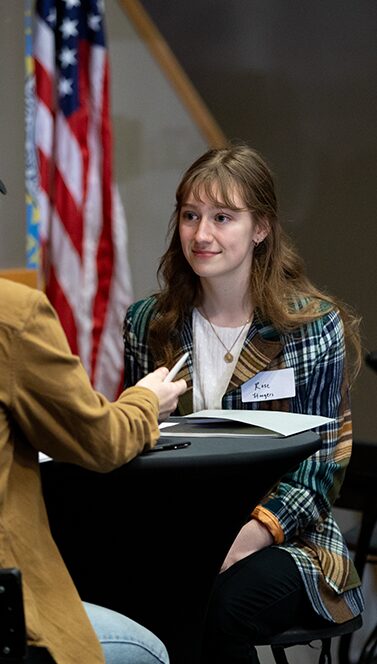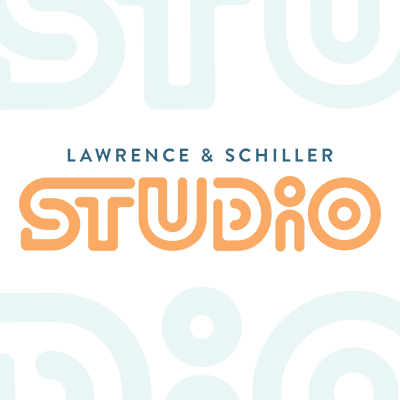10 Interview Questions You Should Know
- 01.10.25
- 5 Min Read
You did it. You got the interview.
You’re seated in the conference room wearing your best “first impression jacket” with a stack of freshly printed resumes. You’re trying hard to stay calm and not fidget when the interviewer asks a simple question like, “What’s your favorite ad campaign?”
Suddenly, your brain is empty. Come on…think! How can you not come up with just ONE ad campaign?
You. Blanked. Out.
I’m here to tell you it’s okay. It happens. And most interviewers will give you grace. But in the moment, it’s the worst feeling in the world. Trust me, no one wants you to go through that.
We’re here to help. Though we can’t predict every question an interviewer may ask, we’ve compiled ten of our favorites to make preparing for your next job interview a little easier. Whether you’re looking for a summer internship or a full-time career, practicing these frequently asked questions can help you never blank on an interview again.
1. “Tell me about yourself.”
This question feels like a lay-up, but it’s important to practice your elevator speech so you can answer it concisely. Rehearse an answer that’s under a minute – a quick summary of who you are, your background and what you’re looking for.
2. “What interests you about this role?”
Pull out two or three key points from the job description that match up with your strengths or experience. This question also gives you a chance to show what you know about the company and why you’re interested in working there over anywhere else. Be specific: if there are certain duties, clients or types of work that intrigue you, say so. Employers like hearing that you’ve done your homework on their company.
3. “What are your strengths?”
It might be a little cliché, but this question does get asked a lot. Employers want to know what you’re good at. Don’t wax on for 15 minutes, but do have a list of 3-4 traits and skills that you excel at and examples of how you’ve used them.
4. “What’s a project you’re proud of and why?”
Employers like specific examples of projects or classroom experiences that have enriched your skills. Be ready to talk about one or two standout projects, along with the role you played in them and what they taught you.
5. “Tell me about a time when you had to solve a problem, overcome an obstacle or show grit and resilience.”
At L&S, we have to solve unique problems every day, and there’s not always a clear process to follow. Employers are looking for people who can persevere, find solutions and be resourceful when they’re roadblocked. Think about one or two examples of how you didn’t give up or showed tenacity in a time where you were tested.
6. “What growth areas are you working on?”
This question might also be phrased as asking about your weaknesses or challenge areas. There is an honest yet positive way to answer this. Instead of phrasing “the thing” as a weakness, talk about it like a goal. “I’m trying to get better in ____ area, and one of my goals for this job would be to gain more experience in it.”
7. “What makes you excited or passionate about marketing?”
At L&S, we live and breathe marketing. We want to hire people who are passionate and dedicated to doing their best work. The biggest way you can stand out is by showing that passion. Prepare for this question by thinking of what gets you inspired. Why did you choose this field? What brands do you admire when it comes to marketing? In what ways have you gone outside of class projects or “duties as assigned” to create great work just because you wanted to? What made you fall in love with marketing?
8. “What would your colleagues or professors say about you if we asked?”
This is a fun question because it asks the candidate to try to look at themselves objectively. If it helps, you can prep by asking a professor or friend this question before your interview. It’s also a good icebreaker to ask someone to be a reference for you.
9. “What do you do for fun?”
An interviewer wants to hear about your work experience, but they also want to get to know you as a person. So give them a whole person to get to know. Be ready to talk about your hobbies and interests, even if they’re niche. (In fact, having a unique hobby is a great way to stand out.) Marketers also need to be plugged into pop culture, so be ready to list books, movies, music and TV you’re loving and why.
10. “Why should we hire you?”
An employer may not ask this directly, but you should still be prepared to answer it. In advertising, we sell products or services. So, if you can sell yourself, you’ll make a great impression. Practice a 30-second speech of why your strengths, experience and passion make you a perfect fit for the role.
But what if I blank out?
Like I said, it happens to everyone. The best thing you can do is plan for it. If you blank on a question, take your time. It’s okay to take a deep breath and think for a few seconds. Grab a drink of water. Repeat the question, or ask the interviewer to repeat it: “Could you explain that question again for me?” If those few moments don’t help, it’s okay to say, “That’s a great question. I’d love more time to think on it. Can we circle back to it?”
A Note for Creatives
If you’re applying for a creative position like copywriting, video or design, you should also be prepared to speak to pieces in your portfolio. Bring a physical or digital copy to your interview, and check out our blog on portfolio advice as you pull your best work together.
Bonus Question: “Do you have any questions for us?”
This innocuous little question is actually one of the most important. An interview should feel like a two-way dialogue between you and the interviewer. If a candidate has no questions for their potential new employer, it could signal a lack of interest or enthusiasm. So, when it’s your turn to ask questions, take advantage of it. Prepare a short list before the interview; it’s okay to write them down and take notes. Here are a few of our favorites:
- Describe a typical day in this role.
- Can you tell me about the team I would be working with?
- What would some of my first potential projects be?
- What skills or abilities would the ideal candidate for this role have?
- What would success look like in the first 3-6 months?
- What do you like about this company, and what’s one thing you would change?
- What does professional development look like here? In what ways does the company invest in ongoing education and training?
Interviews can be nerve-wracking, but they help you determine if you fit a job and the job fits you. Even if you don’t land the gig, with every interview, you learn something and become more comfortable for the next. We hope these questions help. We’ll see you out there.






